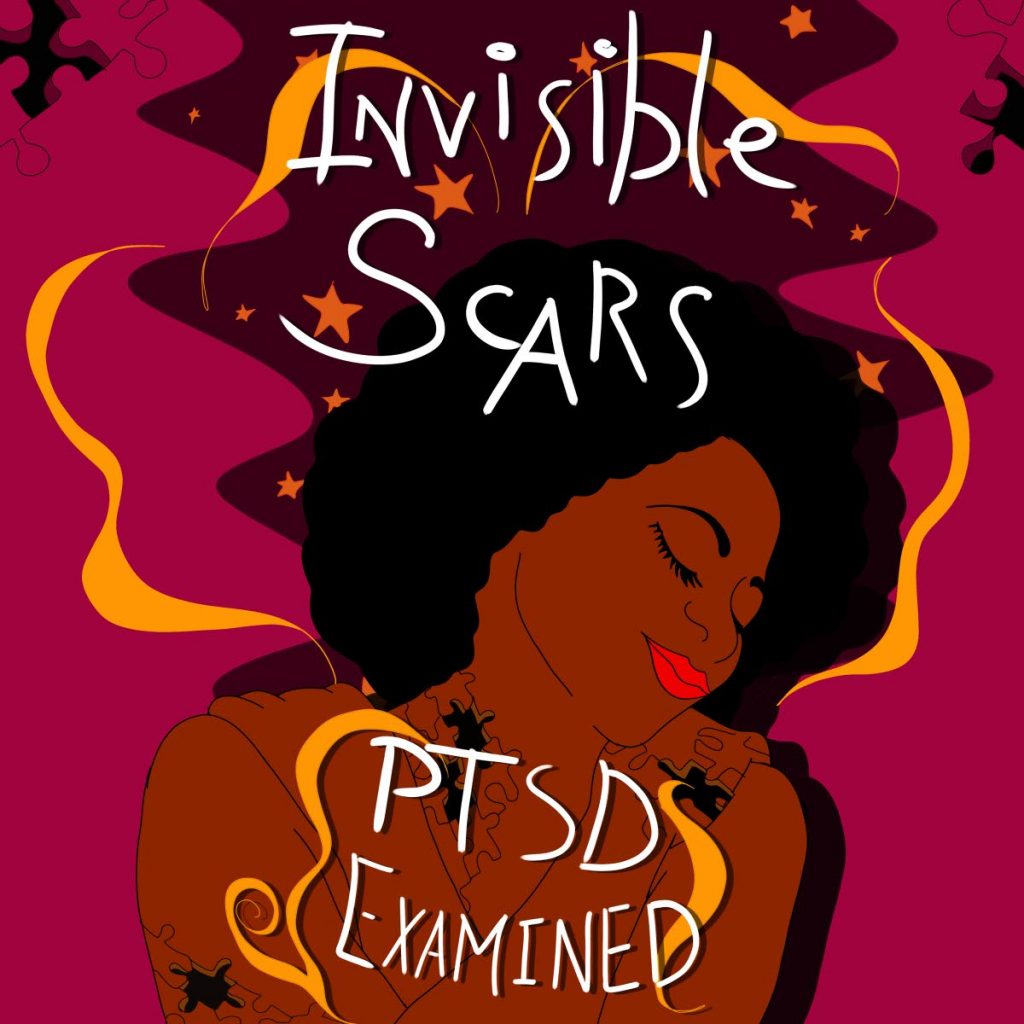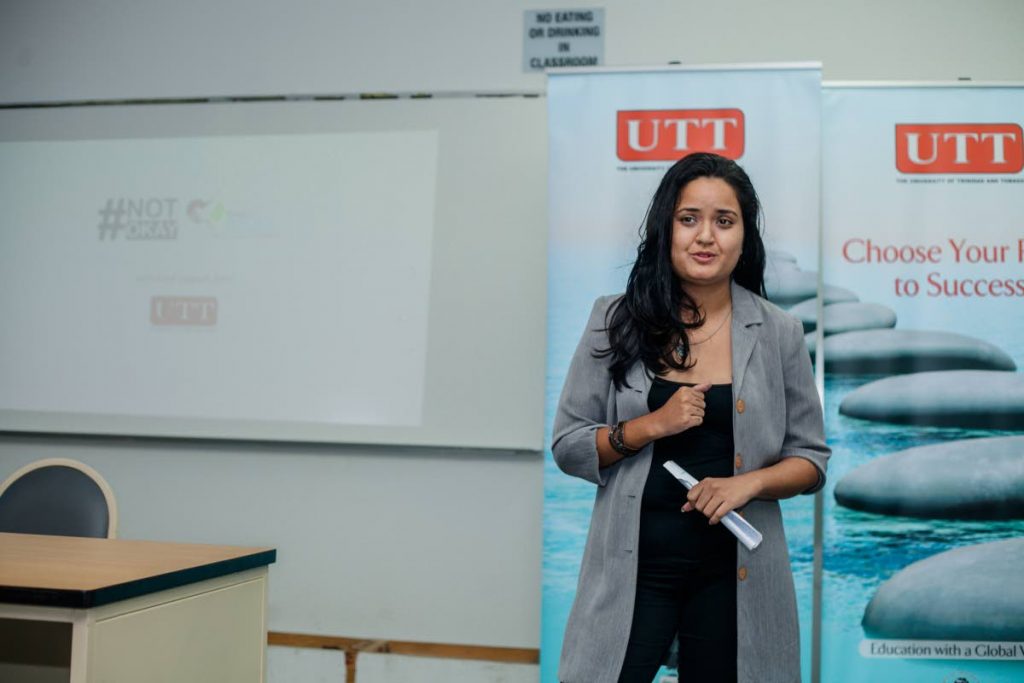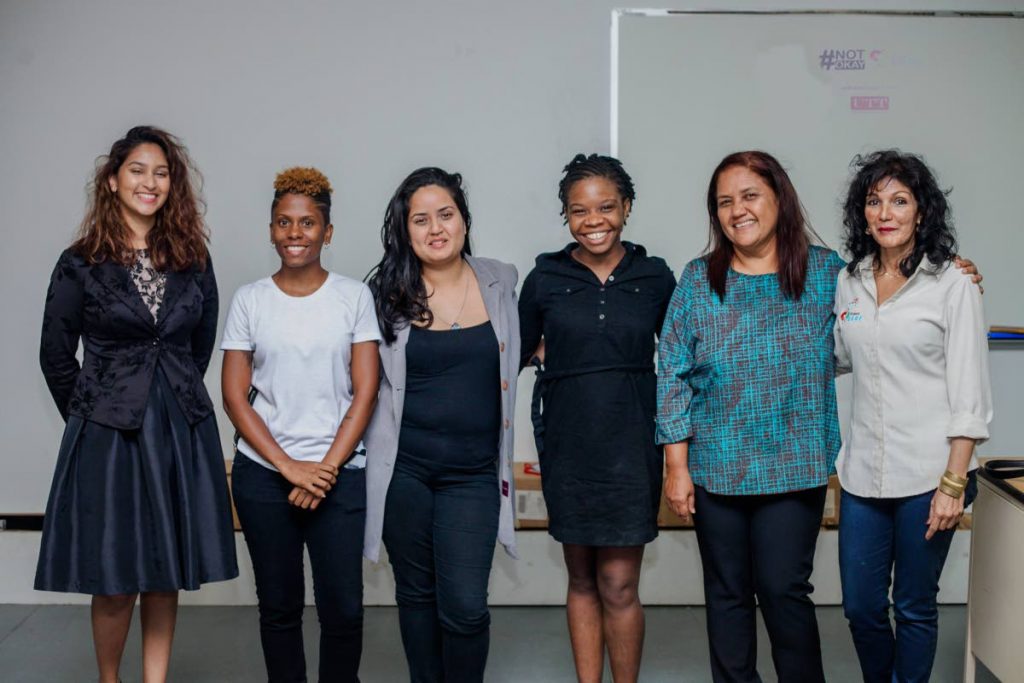It’s #NotOkay

MENTAL health issues are isolating. Often people who have anxiety, depression, PTSD (post traumatic stress disorder) or any mental illness can feel like their problems are unique to them.
#NotOkay, a digital mental health awareness movement aims to get rid of the secrecy, silence, judgment and shame of mental illness by telling their online followers they are not alone. According to their Facebook page, “#NotOkay is the only video platform in the country using social media to educate the population on mental illness and what attitudes towards mental illness and domestic violence are #NotOkay.”
#NotOkay partners with survivors of abuse and mental illness and with mental illness professionals, activists and supportive voices to produce educational and empathetic videos about mental health. “For years now we keep seeing this problem. So many people we knew lost somebody to suicide and it seems to be getting worse and worse, and we saw that this was necessary,” said Candice Alaska, founder and director of #NotOkay.
#NotOkay started last year officially in September for Suicide Prevention month. That was its first campaign. In November it did a campaign on gender-based violence, then a self-harm campaign. Now a PTSD campaign is running.

“We want to show people when you suffer from mental illness you can get better. A big part of why people continue to suffer is because they don’t get the help they need. They don’t seek therapy. They don’t know how to cope. They don’t have a proper support system,” she said.
Alaska is a photographer with a degree in English. This led her to work in social media management for the Met Office and 97.5 FM. Her experience showed her that digital media was the best way to reach people.
“I decided to use the power of social media to get the messages across. Social media is quite influential in our country. A lot of things go viral on social media quickly. Social media is a very powerful place to get to a lot of people. When you do an outreach there can be very few people in the room, but you can reach thousands or tens of thousands online.
“The great thing about social media is that content is there for people to see and save. They see a video on depression they could save it, if they are having moments they could look back,” she said.
As a photographer, she and two other people do the videography for the social posts. They strive to make good quality videos so #NotOkay has a far reach online. They do not boost their content as they want to ensure their content is engaging enough to get organic traction online. “The great things about our content is we don’t put out ads. It’s all organic reach and it shows people want to have these conversations. We only ever boosted one video when we had two likes on the page. That was a video of child sexual abuse survivor named Vanessa who told her story of attempting to commit suicide and feeling judged and laughed at when she told her story to friends when she was seeking a supportive ear. That post had 9.1K views and was shared 197 times.

“We put out US$10. All the likes on the page all the views, they came out organically. We want to make sure we design the videos well. We make them eye catching and make the audience want to engage,” she said.
#NotOkay has a wide range of speakers featured in its posts. Psychiatrist Gerard Hutchinson, Children’s Authority chairman Hanif Benjamin, veterinarian Kyle Salavaria-Assue, rock band Lynchpin, DJ Nick “Colony” Lalla and blogger Nadine Ali were among the people featured in the videos.
“I started doing videos and reaching out to people to appear in the campaigns. Some of the people said they want to be on board and they wanted to have a more long-term, permanent role in the organisation. They wanted to support. Everyone on the team strongly believes in advocating for mental health. Everyone on the team has been impacted by mental health disorders either personally or through a loved one.”
Alaska said the largest response they’ve gotten online has been from the gender-based violence campaign where people such as activist Hazel Brown, comedienne Nikki Crosby and professional boxer Ria Ramnarine participated. The video with the most reach was done by Nisha “Nisha B” Bissambhar called Mental Abuse is Abuse. Nisha B said in the video that though her parents taught her about physical abuse, she was never warned against mental abuse and the verbal attacks and insults a partner could make – diminishing the confidence of the other partner – which she defines as mental abuse. “I want women to understand something. This is very important. Domestic violence comes in two forms: the psychological and the other is physical...psychological is when they mess with your mind. For example, they may say: ‘You horrible looking.’...If you go out with your boyfriend or your husband, and in front a group of men or women they may insult you, and that’s a form of it,” Nisha B said.
That video got 40,000 views with 1,059 shares organically.
On its website, the Not Okay movement featured an essay in the self-harm section about a woman who lived through trichotillomania, a form of obsessive compulsive disorder (OCD) where she pulled out her hair. The essay, Self-Harm Revisited was written by an anonymous 28-year-old woman who compulsively pulled out her hair as a nervous tick after surviving an abusive father, being raped repeatedly, raped by her teenage-uncles and insults hurled at her from her former drug dealing, now reformed church-attending mother who insulted the way she looked because of the compulsive hair pulling.
“From age 11 to 27 I haven’t had a full head of hair, but if you met me in the street you’d never know I had this disorder because I hide it well, with weaves and wigs. I hide from people’s eyes and also as a way of trying to not pull what’s left of my own hair. Some may think it’s not self-harm but it is. It’s not your typical cutting, popping pills or punching a wall but it needs just the same amount of recognition; as many like myself, suffer in silence,” the essay said.
Alaska hopes by telling people’s stories of abuse and struggles with mental health, other people would become empathetic about the mentally ill. She wants people to understand that there are reasons why mentally ill people act the way they do. She said the shame and silence of the abuse is what keeps perpetuating the cycle of abuse, victimhood and suffering.
“A lot is going on in the country. The more we get into gender-based violence, the more we see how sexual assault impacts mental health. Because we don’t talk about it, I think that is what allowing it to happen in the families. There are so many positive things coming from us talking about these things. As well as another girl could read it and think another girl went through this as well.”
Alaska is contemplating putting trigger warnings on the graphic stories like the trichotillomania story to be sensitive of other people’s traumas.
The movement is currently working on compiling a directory of free and affordable mental health care facilities that people can access, as affordable therapy is difficult for people to access.
“The directory will be composed of organisations that offer free or reduced cost support for persons in abusive situations or with mental health issues. Services include counselling services, support groups, safe spaces and hotlines,” Alaska said. Some of the organisations will include the Rape Crisis Society, Families in Action, Wholeness and Wellness, and The Centre for Human Development.

Comments
"It’s #NotOkay"